|
by Luv Mehta For a blog that started off as a general media blog, where most of my articles used to be about movies and TV shows, a lot of people noticed that all my recent articles seemed to be about video games, and asked me why that was. Was I disillusioned with the state of franchise cinema? (Yes, but there's plenty of other movies.) Did I think video games were somehow better at accomplishing their artistic goals than movies? (God no, they're basically the same but I'm not the kind to go on screeds about Gaming As Art.) Was I mentally burnt out because of the pandemic and my personal life and general loneliness and anhedonia, undergoing a general film and show and book slump as a result? (Uh... Yeah, that's basically it, but could you not be this specific in this article?) Anyway, I was part of a chat group with people who choose and watch movies from Mubi™️ (the streaming service, not sponsoring this article) and discussing them at the end of the week. It had been a while since I joined, and it took some time before I actually started watching movies along with them. Once I did, though, I actually ended up enjoying the experience - Mubi™️ has a lot of movies from around the world, and many movies from other states in India as well, most of whose film canon I had no idea about. So basically, I went from watching two movies in the span of eleven months (August 2020 - May 2021) to twenty-six movies (not all of them from Mubi™️) in the span of the next seven months (June-December 2021). And now that 2021 is coming to a close, I've got a lot of movies I watched that I want to write about, even if I don't think I can write a full fledged article on any of them. So, here's a list of all the movies I watched on Mubi™️ this year. Boyz N The Hood 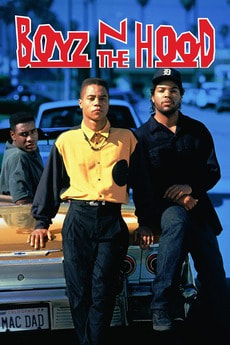 I've already watched this movie before, so I thought that rewatching it would help me get over my film slump. It didn't - I watched this in January of this year, and it took five months more before I finally watched another movie - but it was still a pretty good rewatch. Boyz N The Hood is a 1991 US movie about a bunch of young African-American adults navigating their lives in a low-income neighbourhood, with some having aspirations of stability and some being drawn into gangs and violence, and shines a light on the systemic and cultural factors that conspire to keep black people poor and fighting amongst each other. There are a ton of great actors here, from Laurence Fishburne to Cuba Gooding Jr to Angela Bassett, and even though it sometimes feel a touch unsubtle with its social critique, it's so earnest that it did win me over. Beyond all the observations I had on this rewatch (one of which was that Laurence Fishburne is very, very hot in this movie), I noticed that the movie assumes a lot on behalf of the viewers - specifically, their knowledge about structural racism and the uniquely specific challenges faced by the African-American community. This is fine for US audiences, but won't necessarily be understood by foreigners who don't know about their specific societal issues. On one hand, I did know about that particular background; on the other, I realize how weird it is that I have so much information about the societal issues in a single country. Which led me to a depressing realization - I've watched too many US movies. Which led me to a depressing conclusion - I needed to actively expand my boundaries and explore movies from other cultures and countries. Which led me to a lot of procrastination, right up until I watched another movie from Mubi™️, five months later. ...which was another US movie. Shiva Baby Shiva Baby is a 2020 US movie about a college dropout attending the Jewish equivalent of a Shraadh (called a Shiva), who runs into her ex-girlfriend and her sugar daddy in the same place, and has to navigate her complex feelings, the possibility of being exposed in a get-together, and general disaster bisexual stuff. There's a genre of movies that I consider very specifically tied to US and British comedies, the cringe comedy, where the humour comes from seeing a protagonist be utterly, completely humiliated throughout their runtime (the Meet The Parents series is a great example of this weirdly specific genre). Shiva Baby belongs to this niche, and while I generally don't really like cringe comedies because I end up feeling embarrassed by proxy, I did end up enjoying this quite a lot. One specific reason for this was the protagonist, played by a brilliant Rachel Sennott, whose performance and writing treaded a fine line between being likeable and heavily flawed, so even while I rooted for her throughout the movie, all the embarrassing things that happened to her felt like they were pretty deserved. Those two feelings seem like they contradict each other, but I don't think they necessarily should - how many villains in the history of fiction have had more fans than their stories' protagonists? It's only fair that protagonists should be allowed to express that range as well, and Shiva Baby does an excellent job with this. One final observation - like I mentioned, the film takes place in the Jewish equivalent of a Shraadh, and I did find the experience of being among irritating and nosy family members very relatable. That being said, I can't really keep watching US movies, and if I want to experience different cultures, I should watch movies that aren't solely from countries that western film critics blabber on about, like the US or the UK or France. The Double Life Of Veronique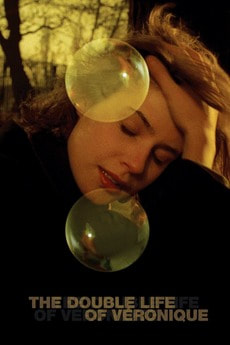 The Double Life Of Veronique is a 1991 French-Polish movie by Krzysztof Kieslowski, most famous for Dekalog and the Three Colours trilogy. This was next in the series of movies the Mubi™️ chat group voted on, and another rewatch for me. The movie revolves around two women who look identical to each other, but were born and raised in two different countries. More mood-oriented than plot-oriented, Veronique explores the protagonists' lives and feelings as they go through their lives and experience romance and tragedy, and how their connection eventually affects them. It's a very abstract movie, so it's not going to be everyone's thing - in fact, most of the chat group that saw this didn't like it at all - but I still really like it. To understand why, I have to be a little snooty and don a makeshift film critic hat, and talk about film texture - the way the characters move, the way the colours saturate (or bleed out from) all the different shots, the way the characters speak, the way they stay silent and let their expressions alone convey volumes, all of it leads to a sort of texture, a way a movie feels to you, which might be something you really like - or something you don't. Thankfully, I really did like it. Unfortunately, I can't recommend it to everyone using concrete terms and points. If the description above sounds nice to you, though, you could always check it out. Tokyo Sonata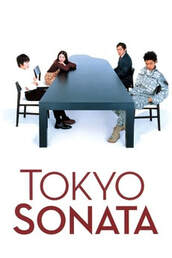 Tokyo Sonata is a 2008 Japanese movie directed by Kiyoshi Kurosawa, the director of classic horror movies from the early 2000s like Cure and Pulse. Unlike those movies, Tokyo Sonata is a movie that's much more concerned with the mundanely heartbreaking. The movie revolves around a family living in Tokyo, whose patriarch loses his job and decides to hide his unemployment from his family, which leads to their relationship worsening as they each feel an increasing dissatisfaction with each other, as well as themselves. There's a lot of tension, anger and sadness brewing beneath the surface, and there's a lot of dialogue where they explicitly talk about these emotions they're going through, and a lot of dialogue where they dance around the fact, and both work equally well in conveying a lot of these sentiments to us very effectively. It helps that the mother and younger son in the movie are very likeable, and that the movie is willing to punish the father in return for his own worst tendencies - the characters end up all feeling likeable as a result, and you do root for them to find some peace and happiness. There's just one flaw in this movie, but it's one that I do have to point out - there's a scene late in the movie where a pathetic side character suddenly tries (and fails) in going through with a sexual assault, and then curses himself for his own cowardice and inability. I get why the scene's added and what it's trying to do, but the sudden tonal shift and escalation feels like it's coming out of nowhere, and the scene left a sour taste in my mouth as a result. Ultimately, though, I'd still recommend it. Air Conditioner Finally, a movie from a country whose films and culture I'm completely new to! Air Conditioner is a 2020 Angolan movie about Matacedo, a security guard in the capital city of Luanda, where a strange phenomenon has started occurring - air conditioners, in every place in the city, have started to fall down. This being a city with hot weather, he's ordered by his boss to get a working air conditioner for him, and has to go around the city to find one - which is, ostensibly, the premise of the movie. What the movie's really about, though, are the alleyways, the staircases, the cul-de-sacs behind the buildings - all liminal spaces, corridors and paths existing in-between, and Matacedo's fellow lower-class friends and acquaintances moving through and existing with him in the in-between. Matacedo comes up to a group of people in a shed behind the building, and they talk with dialogue, without having to open their mouths. The local mechanic is convinced that all the plants in the city are dying. There's a deliberate element of magic realism that suffuses the film, but it serves a purpose I've never seen before in other stories - where a piece of fiction might use magic realism to highlight some strange person, object or metaphor, Air Conditioner uses magic realism to fill these in-betweens with a sense of comfort and tiredness. The poster of this movie shows a snapshot from a dream sequence featuring Matacedo, and this sequence summarizes what I mentioned above in a nutshell - Matacedo's fantasy is one of being able to move between spaces, in the backseat of a car, a cool breeze in his face, as he's able to lie down and just... relax. Needless to say, I really liked this movie. Again, like Double Life Of Veronique, this is another movie works more as a textural experience, asking you to exist within it and feel it. If you're willing to give it a chance, I do think you'll like it. Shatranj Ke Khiladi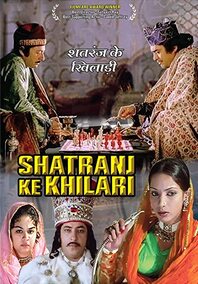 This was another rewatch for me - as a half-Bengali, I've seen plenty of Ray films since my childhood - and it was a nice, worthwhile rewatch. Shatranj Ke Khiladi is a 1977 Indian movie, the only Hindi-language theatrical release Satyajit Ray ever directed. The movie takes place in British India and focuses on the final days of the Avadhi empire, where an ineffectual nawab cowers before the British colonial powers that keep taking his land and money, and two of his ministers fritter their time away in a game of chess. My mother is the biggest Ray fan I know (to be fair, that's probably true of every person in a Bengali family) and it was a delight to discuss this movie with her. Her first few viewings (and my own, from long back) gave us the impression that Ray was interested in the aesthetics and politics of India in the time of British imperialism, and both our recent viewings gave us a new impression - one of a satirical movie where Ray indicts the aristocracy of essentially giving us away to the British. No trades in return (beyond a stipend for the landed gentry to live in a mansion in a city), no violence (beyond threatening us with their armies) necessary for most of us, our nobility owned us and our wealth, and then gave all of it away to be colonized. I don't want to spend too much time focusing on the two leads of this movie, the ministers who play chess, but I do want to quickly mention that their friendship forms the focal point of the movie, and it's a very sweet and funny friendship that the actors and writing portray very well, making us sympathetic to them even as we fully understand how immature they are. What I find fascinating about this movie is the fact that it exists at all in its current form - this is a very intelligent movie, where hand-painted drawings show caricatures to convey complex concepts and metaphors while laying the background of its story. Richard Attenborough and Tom Alter speak in unsubtitled English, which I can't imagine the majority of 1977's Indian audiences must have understood. There are scenes which trust the audience to understand the inherent ridiculousness of their premise, like one where the ineffectual nawab cries about how the British won't take his throne because they don't understand how his sensitive artistic side makes him a better person, and then starts singing his own composition in the middle of his throne room. These are great scenes, sure, but I don't think satire of this nature was the norm in India at the time. So when you hear that Shatranj Ke Khiladi was a financial failure, it's pretty easy to understand why. Still, it's a great movie, and absolutely worth a rewatch. Vagabond Given that I'm using a streaming service that hosts movies for cinephiles from all around the world, it was basically inevitable that I'd watch a lot of French cinema. Vagabond is a 1985 French movie by Agnes Varda, focusing on the final days of a vagabond woman who roamed the countryside. The protagonist is utterly fascinating - she's heavily flawed and makes no excuses for herself, she seems pathologically against all forms of authority (to the point where she'll self-sabotage and run away from situations where she has to answer to someone else), and she lies and manipulates people as necessary to her survival. She touches many lives as she passes through them, and some express disgust at her, while others admire her and wish they had the courage to escape and live life on their own terms. The movie itself takes no side on this matter, refusing to either condemn her choices or affirm her free-wheeling spirit - instead, Varda wisely understands that the actual core of the movie is about understanding and empathizing with the protagonist as she exists and lives, inviting us to understand her choices instead of making grand idealistic statements, and understanding all the good and bad that comes to her life, both as a result of her choices as well as the whims and fancies of a cold and uncaring world, most of which is hostile to a woman in her shoes. Of the new movies I watched on Mubi™️ this year, this was easily the best of them - it's a tough but fascinating watch, an uncompromising work I haven't stopped thinking about since I watched it. Maybe French cinema is alright. Jules And Jim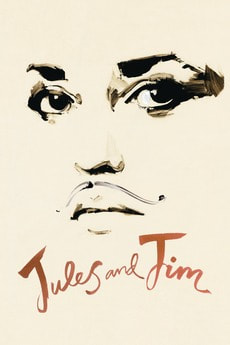 Or maybe not. Jules and Jim is a 1962 French movie directed by Francois Truffaut, one of the most popular movies to come out of the French New Wave, and still considered a masterpiece by many, and I didn't like it. Let me explain why. Jules and Jim revolves around the titular Jules and Jim, a Frenchman and a German living in the times before and after WW1. Jules and Jim also revolves around Catherine, a woman close to the duo who enters a relationship with Jules, and forms a love triangle among the three of them. The first half is fast-paced, exhilarating and funny, following them as they move through their lives and influence each other, and the second half slows down and becomes considerably darker, showing the fraying of their relationships and the mental toll those relationships take on all of them. Only... Not really. That's what a lot of reviews mention, and I don't understand any of them, because the second half they saw seems to be completely different from the second half that I saw. Before I explain why, I want to mention this - Jeanne Moreau, the actress who plays Catherine, is incredible, infusing complexity into her character through her performance. Her writing, too, seemed to be doing the same - in the second half, as their relationships degrade and tensions run high, Catherine does a lot of impulsively horrible things to hurt both Jules and Jim, and Catherine's performance is layered enough to make her likeable nearly all the way through to the end. Maybe there's an element of sympathy on my part as well - I've had friends who suffered from mental illnesses like Borderline Personality Disorder, and I've seen the kind of mental state they're in when they're self sabotaging and hurting everyone around them in the process of hurting themselves. But by the end, when I'm looking at the movie as a whole, it doesn't actually give Catherine any complexity by itself - Catherine is written to be cruel through to the end, and there is no balance in the writing of the movie to understand and portray her side, or even show any of the others as being cruel on their own. In the end, all the seeming complexity is solely brought through by Jeanne Moreau's performance, with the story itself solely viewing her as a force of chaos and evil, whose only function is to destroy the nice friendship Jules and Jim shared. God, this was so disappointing. Maybe I shouldn't have been so mean to US cinema. Princess Cyd This is an interesting one, because in the Mubi™️ club meet, I was the only one who liked this movie - everyone else completely, utterly hated it, a sentiment I found baffling. Princess Cyd is a 2017 US movie about a teen girl who goes to visit her aunt in a small sleepy neighbourhood in Chicago. It's near-completely conflict-free, with the few moments of tension being quickly resolved, and mainly revolves around how the niece and aunt influence each other during the former's stay, as well as what they learn from each other. Like Veronique and Air Conditioner, this is more of a texture movie, inviting you to hang out and relax with the pair as they sunbathe in their lawns, or as the niece explores her sexuality with a barista as they romance each other on a sunny rooftop, or as the aunt organizes her cultural get-togethers as a way for people to hang out and express themselves with comfort. The element of sexuality remains a focal point through the movie in various other ways - the niece wears a suit to a party after discussing alternative gender expressions with her aunt, the aunt comes to terms with her own asexual and aromantic nature and expresses how she finds fulfilment in her own life. There's nothing that especially amazing about it, but I did appreciate the vibes and went with it, and I'm glad I watched it. I hope Mubi™️ has more films that use sexuality in nice chill ways. Dona Flor And Her Two Husbands Though this probably won't be one of those. This is another interesting one, because in the Mubi™️ club meet, I was the one of the few people who didn't like this movie. Dona Flor And Her Two Husbands is a 1976 Brazilian movie about Dona Flor, a woman who gets married twice, and the contrasting nature of the two relationships and how they fulfil her in different ways, and how they leave her unfulfilled in the exact opposite. Sort of. After showing an introductory scene where Dona Flor's first husband collapses on the street and dies while being in the middle of a party procession at dawn, the movie flashes back and shows how the first husband was abusive and unfaithful towards the lead - he openly cheats on her and keeps going to the brothel, he gambles all their money away and beats her when she refuses to lend him any more, he refuses to take her to any of the parties he goes to. The sole positive in their relationship is their sex life - except not really? The movie wants to impart that idea to us, but Dona Flor and her first husband don't actually hook up more than a couple times onscreen during their marriage (which all seem to be pretty standard and tame, with nothing particularly uniquely exciting), and most of their relationship just shows Dona Flor feeling dissatisfied and angry with her husband. The second half sees Dona Flor remarry, this time to a respected pharmacist, and this relationship apparently fulfils all the things she wanted from her previous relationship - except not really? Again, the movie wants to impart that idea to us, Dona Flor and her second husband seem to have a boring sex life, sure, but we didn't really see an exciting or active sex life in her previous relationship anyway, and while her second husband does invite her to his own parties, they're shown to be completely dry and boring to her. This is explicitly and deliberately shown as a counterpoint to her exciting first husband, but that guy never involved her in his parties or life anyway! In the end, there's an interesting twist that takes the story somewhere nice, but it all revolves around the idea that Dona Flor can only gain a fulfilling relationship through a confluence of her previous two, and the film doesn't really give us any proof of that. So, sure, Sonia Braga is very engaging as Dona Flor, but the movie just ended up feeling very frustrating to me. And even as a racy fun movie, it doesn't do much to actually be fun. At least, it didn't for me. Nirbachana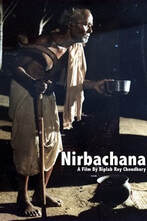 This is the first time I've ever seen an Odiya film. Nirbachana is a 1994 Indian movie from Orissa, directed by Biplab Roy Chowdhury. 'Nirbachana' means elections, and the movie takes place in a poor village adjacent to a coal mine, whose landlord comes to them and promises to pay them in exchange for votes for him in the upcoming local elections. Getting the negatives out of the way - the first thirty minutes of the movie may or may not be for you, acting more like a trance movie, setting mood and feel through the dust enveloping the village and its inhabitants and being very light on dialogue. There's also a relationship between a son from a family and a daughter from another, and the relationship was pretty confusing to me because there were two sons from the two families who looked very similar and ended up confusing me a lot (though, to be fair, the Mubi™️ print for this movie is atrocious, being low-resolution and poorly encoded, to the point that a lot of the facial details in the movie are unintelligible). Now the positives - this movie is brilliant! Unlike some of the movies above that relied more on a textural experience of immersing the viewers in vibes, Nirbachana boasts strong writing and excellent thematic complexity to complement its own vibes throughout. As part of the central premise, the village chief takes a dying beggar into his house to collect the money on his behalf for his own son's dowry, and his family eventually grows to care for him. There's an interesting parallel through the beggar's relationship to the chief's family and the chief's relationship to the landlord - in both, the former is subservient and fervently faithful to the latter, and the latter maintains a sympathetic but distant and calculated relationship to the former, with the aim to ultimately use them for their own ends. All this culminates in a brilliant final scene, freezing on a singular image that encapsulates all of the above in a way that's a bit unsubtle but completely effective. If you have an issue with the first thirty minutes, just stay on-and-off your phone throughout. But please do watch this movie, it's fantastic. Dogtooth I watched this movie long ago, when I was specifically looking for fucked up movies to watch - this was a nice rewatch nonetheless. Dogtooth is a 2009 Greek movie by Yorgos Lanthimos, revolving around a family where the patriarch has kept his three children sheltered within their house and lies to them about how they can't ever leave because the outside world is too dangerous, redefining words like telephones to associate them with household objects like salt, essentially creating a micro-society where every part of their upbringing is solely dictated by them, with zero external cultural factors. Lanthimos is especially famous these days for his English-language movies that are similarly disturbing, but even back then, Dogtooth was famous enough to become a household name for many budding cinephiles. Lanthimos takes the concept to its extremes to explore all the ways in which this family would actually function, and the dysfunction that would develop in his children - the two daughters and single son in the family are all dressed up as young precocious children, but are all clearly in their late teens and undergoing puberty, and the ways the parents deal with their budding sexualities are all horrifically wrong and keep making things worse. The only movies they see are home movies of their own childhoods, seen so frequently that the children know all the lines by heart. Fish and cats are all shown to be horrific monsters so the children stay away from any that they find - and I could go on and on, but it's better that you watch it on your own. There are a lot of interesting things in the movie, and if you haven't seen it yet and are in the mood to watch something like it, it's a great watch. 27 Down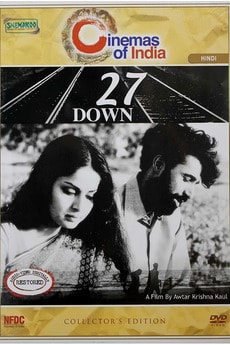 27 Down is a 1974 Indian movie that somehow feels very, very modern. It won the best Hindi Language film in the National Film Awards, but was tragically the only movie directed by Awtar Krishna Kaul, who died in an accident soon after the film was released. The movie is about a man, Sanjay, a train conductor who lives an empty, unfulfilling life controlled by his father, who lives and sleeps solely in train carriages, and who briefly finds love in a relationship with an insurance corporation employee, before even that is forcibly taken from him. It's about the corporation employee, Shalini, who briefly starts believing that she could find love in someone else, before life shows her how she should never trust anyone but herself ever again. It's about the single track their lives are set upon, where any deviation ends up punishing them, and they end up self-sabotaging and pulling away from everyone else to protect themselves. It's a great movie, if not a happy one. It's a movie I ultimately recognize is really, really effective, but my viewing experience of it wasn't great - something I suspect wasn't the fault of the movie. This is the only entry in the list I feel unsatisfied writing - I brought my own baggage to the movie, and it weighed me down to a point where I couldn't watch it properly. I'll have to watch it again in the future to appreciate it, I think - though I do recommend it if you're in the mood for something like this. Mandabi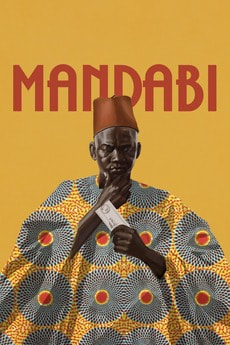 Thankfully, I was in a proper state of mind to watch this movie, and I'm thankful for it, because Mandabi is fantastic! Mandabi is a 1968 Senegalese movie about a patriarch in a poor family living in Dakar, the capital city of Senegal, and a money order he receives from a cousin in France that he has difficulty encashing because of bureaucracies and greedy opportunists. Some background on Senegal - like most African countries, it's a former colony kept in crushing debt to France, whose culture was near-completely replaced with French culture, to the point where its official language is still French, despite having a lot of native languages being used instead by its inhabitants. Mandabi was the first Senegalese movie to be shot in Wolof, a native language understood by most of the country, and it's quite telling how it chose to place its focus on communities kept in extreme poverty, surviving either through borrowing or stealing from each other. This is another movie I really want more people to watch, so I won't spoil anything, but I do want to mention something specific about the movie summaries Mubi™️ keeps for many of the movies from lesser-known film industries from around the world - Mandabi's official Mubi™️ summary describes it as a movie about oppressive bureaucracy, when the movie itself is more concerned with the poverty faced by a post-colonialist country. I saw the same thing for Nirbachana, where the movie inaccurately stated something about the relationship between the chief and beggar in that movie. This is not sponsored by Mubi™️, but if anyone from your website is reading this, take a look! Seriously! Night Of The Living Dead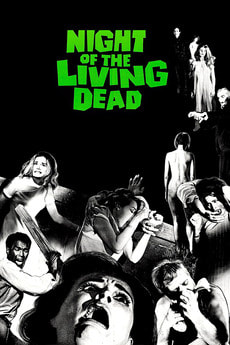 This is another rewatch for me, and I think most budding cinephiles always keep this in their must-watch horror movie lists anyway. Night Of The Living Dead is a 1968 US movie that essentially serves as the prototypical zombie movie (at least, the zombie that exists in its modern cultural form). It's interesting to view it as such, sure - we've seen so many zombies in so many forms throughout the years - but it's far more interesting to see it as a movie about the cultural fears of the 60s, the societal mistrust it exacerbates and the state violence it enables. The zombies are described as ordinary looking people walking through the streets, as if caught in a trance, and attacking people in the streets - there's a scene mentioning radiation from some other planet as a possible cause, but it isn't that important overall. The choice of a black protagonist for this movie also underscores the social tensions by portraying a racial element to the mistrust within the survivors' house, as well as the final, devastating scene. Night Of The Living Dead and Dawn Of The Dead are such interesting cultural products that it sometimes feels wrong to solely see them through the lens of the zombie canon they essentially constructed, though that is still a valid lens to view them through. Anyway, though, if it couldn't be clearer, I really like this movie! Through The Olive Trees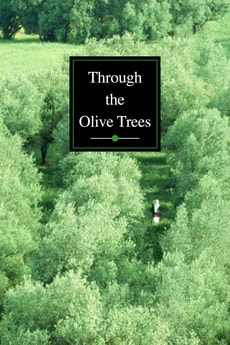 I really wanted to like this movie! Through The Olive Trees is a 1994 Iranian movie by Abbas Kiarostami, the third part in his Koker trilogy, a series of loosely connected movies that follow each other in increasingly more metafictional ways. The first movie in the series, Where Is The Friends Home, was a normal movie about a child searching for his friend's home, while the second, Life, And Nothing More... was more of a semi-fictional documentary piece about the director's own experiences (with an actor playing his part) while searching for the previous film's actors following the 1990 earthquake. Through The Olive Trees, the third part, takes it a step further, showing the events that took place during the filming of a single scene in Life, And Nothing More... (with two actors playing his part, one directing the scene and one within it), which revolved around a couple that married after the earthquake - except here, the behind-the-scenes look shows that the actors had a conflict between them, where the man demanded that the woman marry him, while the woman kept trying to avoid him and stayed silent between takes so he would stop talking to her. Before I get into why I didn't like this movie, I have to talk a little bit about what I thought of its metafictional nature - there is a lot of analysis that could be made by analyzing the different layers of fiction-within-fiction within this movie, but I think it's simpler and more accurate to see this layering as representative of a blurring of the lines between reality and fiction. Did a pair like this exist in real life? I don't know, maybe they did, maybe they didn't. But the director within the film of the film was interested in their story, and the director one step above was interested in viewing and encouraging the unrequited entitled affections of the male lead, which leads me to believe that this story, whether real or not, was one the director specifically, personally wanted to tell. And that's why I dislike it so much - the story of the male lead is extremely aggravating! This isn't a story focusing on a relationship between the male and female leads, or even the animosity between them, because the film doesn't really care about the female lead at all, shoving her to the sidelines and keeping her silent and distant from the camera. This is a story of the male lead, and as he talks about how he deserves the woman's hand in marriage (the woman has never spoken to him), talks about how the woman was clearly looking at him with affection (the camera rarely, if ever, focuses on the woman's face) and asserts that her family died as divine justice because they refused him for marriage. All of this is said to the director, who barely challenges or replies to any of this, and encourages him to follow her as she's rushing away from the set at the very end. And, sure, you can write stories about flawed leads and unhealthy obsessions, but I don't see the film as seeing this lead as flawed or this obsession as unhealthy - the metafictional nature reinforces that this, specifically, is the story the director is interested in telling us. And that's irritating to the point where, even with hindsight, this movie just leaves me frustrated and angry. This wasn't a popular opinion in the Mubi™️ club meet I attended, since all of them absolutely loved this movie, so take my opinion with a grain of salt, especially if you've already seen Kiarostami movies and like his stuff. Either way, though, this is the most beloved and acclaimed movie I neither liked, nor would recommend. Cop Au Vin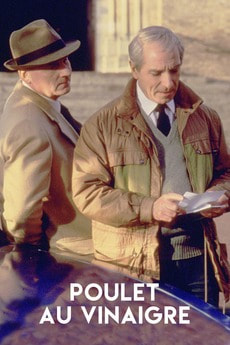 Also known as Poulet Au Vinaigre, this is a 1985 French crime drama about a small French village where a series of deaths leads to a violent cop coming in to investigate. It's... fine. It's well made, it works well as a crime drama, I think there's some interesting stuff that could be said about the cop that was inexplicably famous in France and got spinoff movies and TV shows focusing on him, but there's really not much to say. As a masala movie, it's got some mild spice. As a mystery movie, you know the answer from the beginning, but there are a few interesting turns. The women are all surprisingly well-written and acted (and despite the reputations of this genre and of French cinema from last century, not written with any misogyny in mind). It's fine, really! It's worth watching if you want to check out a popular masala movie from 80s French cinema, though I didn't really get anything else from it. As a Mubi™️ watch, it's good to watch something mainstream from a culture that's not your own too, so I'm happy I watched it once. It just isn't a movie you think about all that much once you're finished with it. Lekhayude Maranam Oru Flashback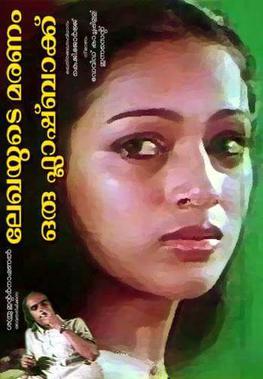 Thankfully, this one is. Lekhayude Maranam Oru Flashback (English title - The Death of Lekha: A Flashback) is 1983 Malayalam movie about a young actress who committed suicide while seemingly at her career peak. The film apparently draws parallels to a real-life Malayalam star named Shobha who went through similar events and committed suicide as well - actually, wait, let me talk about those specific events instead of putting them under that vague umbrella phrase. Shobha joined the film industry at a comparatively young age, and the industry was already infamous among whisper circles for having casting couches and sexually exploiting young women who came to Chennai for work, so we can only imagine how she was able to survive and thrive - although her mother was a character actress herself, so that must have helped. By the age of 17, she had already starred in at least 70 movies (Wikipedia says 73, but some Malayali friends say there are some missing films in the list). By the age of 17, she was also in a two-year relationship with Balu Mahendra, a 41 year old director, who took her suicide as inspiration for his next movie, because our society allows old male directors to get away with anything. Lekhayude Maranam Oru Flashback stays pretty close to this timeline of events, except for changing the mother figure to an ordinary housewife who becomes an entrepreneur and real estate investor through her daughter's earnings, pushing her further into her career and ignoring all the ways in which she's being exploited. Even the fictional director in this movie is clearly old and completely fine with sleeping with the titular Lekha, an extemely young woman even in the movie's text. It's a harrowing watch, but I'm ultimately glad to have watched it. Some caveats though -
Beanpole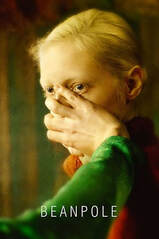 This is an interesting movie, in part because it was divisive within the Mubi™️ club meet. Beanpole is a 2019 Russian movie set in the post-WW2 period, where Russians were returning to their homes and having to adjust to their new lives, and focuses on two leads - Beanpole, a tall woman who suffers from occasional fits of paralysis due to wartime injuries, and Masha, a woman suffering from mental and physical trauma from her own service period. To say more would be spoiling the movie, but I will say this - it's a very good movie, but it's a very, very depressing movie, with an early scene depicting a shocking tragedy and the rest of the movie being suffused in a lot of anger and sadness. The performances in this movie are also uniformly brilliant, but I want to give specific mention to Vasilisa Perelygina, the actor who plays Masha - she has to show frustration, anger, fatigue and depression, and she has to show them boiling and barely restrained underneath the surface, and she does so brilliantly, couching her emotions in a smile that somehow clearly and unambiguously portrays all the emotions she's hiding. It's a seemingly self-contradictory performance she has to engage in, and she's absolutely amazing. The King Of Comedy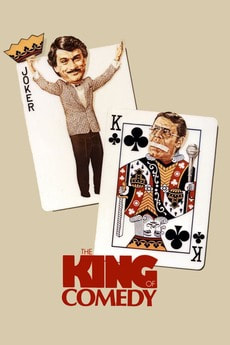 The King Of Comedy is a 1982 movie directed by Scorsese. This was a rewatch for me, and while I loved the movie the first time I watched it, I now think it's a flat-out masterpiece. The movie focuses on Rupert Pupkin, played by Robert De Niro in a performance that goes against type, a delusional stalker who aspires to be a comedy host on TV and is obsessed with Jerry Langford, a successful late night show host, eventually letting his delusions push him towards kidnapping Langford in a bid to finally get his big break. All the performances in this movie are fantastic, but I have to mention De Niro, who is absolutely perfect in the role. Above all, though, I have to mention how good Scorsese is as a director here - the way he moves between Pupkin's delusions and reality to leave us slightly off-kilter, playing with our expectations at the perfect moments and balancing his viewpoint by letting his personality bounce off of others skeptical and hostile towards him, so even while we understand and are immersed in his viewpoint, we never feel like the movie is trying to make us side with him. Put simply, we empathize with him, even if we don't necessarily sympathize with him, and that's a staggering achievement that even its modern spiritual successors can't replicate. You could say that Martin Scorsese... truly makes Cinéma. Rojo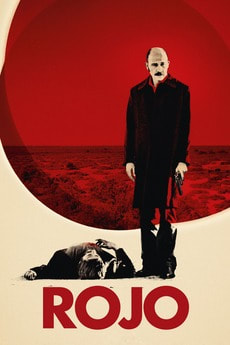 Rojo is a 2018 Argentinian movie that focuses on mid-1980s Argentina, notable for avoiding showing the atrocities and political instability directly, choosing instead to keep them in the backgound and let them simmer and constantly threaten to boil over and destroy everything in the world of the movie. The story foregrounds a lawyer with a shady past, making it day-by-day through tense neighbourhoods and vacating homes until his past catches up to him. Honestly, the plot itself doesn't matter all that much - if there's a thematic link to the political situation of the time, I don't see it, though to be fair, I'm an Indian who didn't know a lot about the country's history until very recently. For me, Rojo's plot seems to work more as texture, externalizing the underlying tension through pure vibes, with a lot of scenes and plotlines that seemingly go nowhere, but work in increasing our stress levels very quickly. All this to say that I ultimately didn't care very much for Rojo. It started off very strongly for me, but by the end I didn't really are all that much about the story or the vibes. This may be a criticism of the movie, but this might also be a limitation on my end, and I wonder how Argentinians reacted to it. Azor Azor is a 2021 Argentinian movie that focuses on mid-1980s Argentina, notable for avoiding showing the atrocities and political instability directly, choosing instead to keep them in the backgound and let them simmer and constantly threaten to boil over and... wait, this again? Does Argentina have a history of unsubtle masala thrillers about the mid-80s already? Is it somehow gauche to actually show what happened? Or is there some political reason the directors can't show movies about it? Anyway, this story foregrounds a private Swiss banker who comes to the country to take over from his partner and serve the rich. The movie mainly focuses on how these rich people dance around their actual intentions while talking business, letting us infer their support of the fascists from subtext alone. There is one moment where subtext becomes text for a while, and while it's very welcome to see, it comes very, very late in the movie, and frankly, my investment in it was long gone by then. No more Argentinian movies for me. Argentina is banned from existence. Demonlover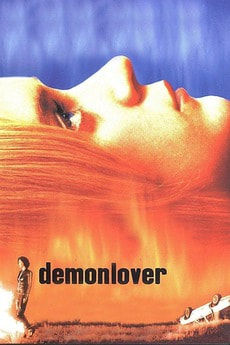 This wasn't actually voted on by any of the Mubi™️ club members, I just wanted to watch it after Azor because I wanted something taboo and interesting. Demonlover is a 2002 French movie directed by Olivier Assayas, apparently part of the New French Extremity wave of movies, which showed extreme content and explored transgressive topics. The movie itself is about two rival hentai companies that are vying for foreign market control, and the espionage they conduct eventually erupting in violence and horror. Demonlover explores commodified misogyny, pornography and torture in modern capitalism, and it does so in ways that are extremely interesting. The movie's protagonist is a morally bankrupt woman who does a lot of horrible things to climb up the ladder, but the more she climbs, the more she finds other people who've done worse things and are ready to punish her for flying too close to the sun, with the intent on subjecting her to the same misogyny she trafficks in. Extremely heavy content warning for this one - explicit gore, lots of (typically pixelated) Japanese pornography, both animated and live-action, most of which is non-consensual, and lots of scenes of implied torture for sexual gratification. Nishant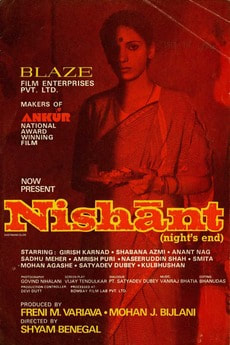 Nishant is a 1975 Indian movie directed by Shyam Benegal, taking place in a feudal village in 1975 ruled by a family of landlords that exploit and rob and rape their underlings with no consequences, where a newly arrived woman gets kidnapped by them in broad daylight and the entire village is unwilling to help her husband get justice through any official circles. As that summary makes clear, this is a very dark movie. I was talking to my mom about it (she's seen all of Benegal's filmography) and she mentioned that the director was known for making depressing art films that won a ton of awards (including this one, which won the National Film Award for Best Hindi Feature Film). I haven't seen a whole lot from him, only having seen the movies he made during my lifetime, but her summary makes sense when looking at Nishant, which submerges its characters in despair and hopelessness, with the central villainous family showcasing multiple types of characters that express their entitlement and exploit others in different ways. And all of this leads to the final thirty minutes that are just incredible filmmaking, slowly building up the tension and leading to an incredible finale, one that goes from cathartic to uncompromisingly tragic. No complaints, highly recommended. That took a long time to write - I watched 27 movies this year? That's honestly unbelievable! This article ended up being extremely long as a result, so if you scrolled through it while looking for specific movies you recognize, don't worry about it. It can be our little secret. Anyway, though, thanks for reading, and I hope I can write an even longer article next year!
Follow us on Facebook and Instagram to be notified whenever we release new articles.
Do you use an RSS reader? Even better!
6 Comments
Luv Mehta
22/12/2021 11:22:44
I just checked my own letterboxd profile to remember them lmao
Reply
Leave a Reply. |
Categories
All
Archives
December 2022
|
 RSS Feed
RSS Feed
